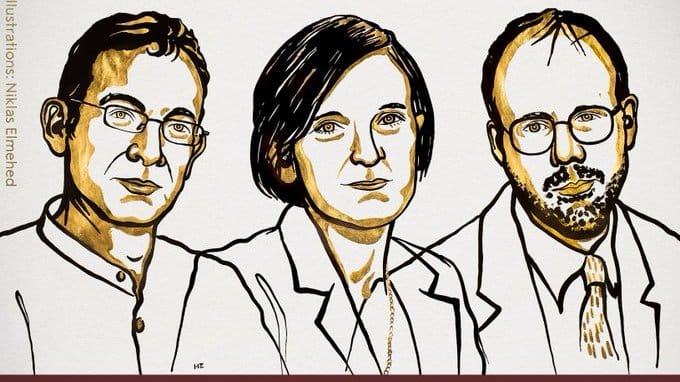Stockholm: Abhijit Banerjee and Esther Duflo of the Massachusetts Institute of Technology (MIT) and Michael Kremer of Harvard University were awarded the 2019 Nobel Prize in Economics “for their experimental approach to alleviating global poverty.”
“The research conducted by this year’s Laureates has considerably improved our ability to fight global poverty. In just two decades, their new experiment-based approach has transformed development economics, which is now a flourishing field of research,” according to a statement on Monday.
Abhijit Banerjee, born 1961 in India, was educated at the University of Calcutta, Jawaharlal Nehru University and Harvard University, where he received his Ph.D in 1988, according to information on the MIT website.
Duflo, who was born in 1972 in Paris, obtained her Ph.D in 1999 from MIT. Kremer, who was born in 1964, got his doctorate from Harvard in 1992. The three were recognized for their ability to divide the vast issue of tackling global poverty into smaller subjects, the committee said.
A Powerful Approach
“In the mid-1990s, Michael Kremer and his colleagues demonstrated how powerful this approach can be, using field experiments to test a range of interventions that could improve school results in western Kenya,” it said. “Abhijit Banerjee and Esther Duflo, often with Michael Kremer, soon performed similar studies of other issues and in other countries. Their experimental research methods now entirely dominate development economics.”
The theories that winners develop often take on a different status after a Nobel is handed out, which can result in greater influence on areas such as government policy and investment strategies. Last year’s prize went to William D. Nordhaus of Yale University and Paul M. Romer of the Stern School of Business in New York for bringing long-term thinking on climate issues and technological innovation into the field of economics.
Previous laureates have included Milton Friedman, Paul Krugman, Eugene F. Fama and Friedrich August von Hayek. In 2009, three years before her death, Elinor Ostrom made history when she became the first woman to receive a Nobel in economics, which she shared with Oliver Williamson for their research into the limits of markets and how organizations work.
Annual prizes for achievements in physics, chemistry, medicine, peace and literature were established in the will of Alfred Nobel, the Swedish inventor of dynamite who died in 1896. The prize in economic sciences was added by Sweden’s central bank in 1968.
The peace prize, which was announced in Oslo on Oct. 11, was awarded to Ethiopian Prime Minister Abiy Ahmed for his work to end almost two decades of conflict with neighboring Eritrea. The chemistry prize was awarded on Oct. 9 to a trio of pioneers of the modern lithium-ion battery, M. Stanley Whittingham, Akira Yoshino and John Goodenough.
On Oct. 8, Michel Mayor, Didier Queloz and James Peebles were awarded the Nobel Prize in physics for “contributions to our understanding of the evolution of the universe and earth’s place in the cosmos.” The award in physiology or medicine, announced on Oct. 7, went to William G. Kaelin, Peter J. Ratcliffe and Gregg L. Semenza for “their discoveries of how cells sense and adapt to oxygen availability.”
There were two sets of literature prizes this year, announced on Oct. 10, after the 2018 award was postponed following a scandal in which the husband of former academy member Katarina Frostenson was sentenced to prison for rape. The winners were Polish author Olga Tokarczuk and Austria’s Peter Handke.
Each award carries with it a cash prize of 9 million kronor ($917,000). Due to the depreciation in the Swedish krona, the dollar value of the prize has fallen by about 30% over the past decade. The economics prize completes this year’s cycle of Nobels. – Bloomberg
Also read: Abiy Ahmed has won the Nobel Peace Prize, but Ethiopia still faces big challenges






